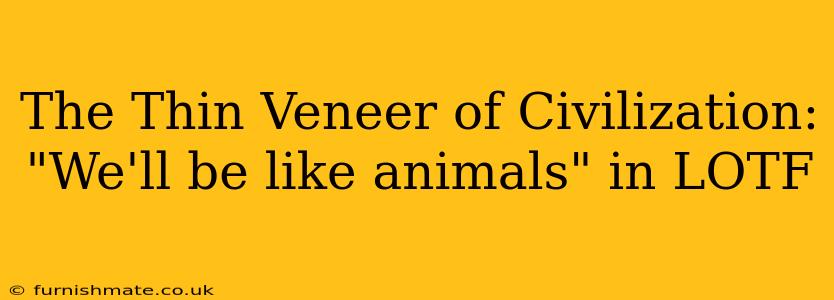William Golding's Lord of the Flies is a chilling exploration of human nature, a descent into savagery masked by a thin veneer of civilization. The chilling statement, "We'll be like animals," uttered by the boys, encapsulates the novel's central theme: the fragility of societal order and the ever-present potential for primal instincts to overwhelm reason and morality. This essay will delve into this crucial phrase, exploring its context within the narrative and analyzing its broader implications.
What does "We'll be like animals" actually mean in the context of the novel?
The phrase "We'll be like animals" isn't a simple prediction of physical brutality. It speaks to a deeper, more insidious transformation. Initially, the boys attempt to maintain a semblance of order, electing Ralph as their leader and establishing rules. However, as their rescue hopes dwindle and fear grips them, their civilized facade begins to crack. The statement signifies a loss of inherent humanity—a regression to base instincts driven by survival, power, and a terrifying release from societal constraints. It's not just about violence; it's about a loss of empathy, reason, and the moral compass instilled by civilization.
How does the quote reflect the boys' descent into savagery?
Golding masterfully depicts this descent. The initial attempts at building shelters and maintaining order are gradually replaced by hunting, tribalism, and ultimately, violence. Piggy's murder is the horrific climax of this de-evolution, a symbolic act representing the complete annihilation of reason and intellectualism by brute force. The paint on Jack's hunters' faces, initially a simple mark of identification, becomes a mask, hiding their humanity and fostering a sense of anonymity that allows for unchecked aggression. The boys' language also degrades, mirroring their descent into primal behavior. The sophisticated language of the beginning gives way to chants, screams, and the bloodthirsty cries of hunters.
Is the statement a prophecy or a warning?
The statement functions as both a prophecy and a warning. It's a prophecy because it accurately foreshadows the boys' actions. Their behavior progressively deteriorates, culminating in unspeakable acts of violence and the near-complete abandonment of their former selves. But it also serves as a warning. Golding isn't simply presenting a bleak depiction of human nature; he's offering a cautionary tale about the fragility of civilization and the ever-present threat of its collapse if reason and morality are abandoned. The novel suggests that the veneer of civilization is remarkably thin and easily shattered under pressure.
Why is the island a significant setting for this transformation?
The island's isolation plays a critical role in the boys' descent. Cut off from the adult world and its rules, they are left to their own devices, forcing them to confront their inherent nature without the societal structures that typically restrain it. The island itself becomes a microcosm of the world, reflecting the inherent potential for chaos and savagery that lies beneath the surface of even the most orderly societies. The natural beauty of the island initially offers a sense of freedom and excitement, but ultimately becomes a backdrop for their primal struggle for survival and dominance.
Does the novel offer any hope amidst the despair?
While Lord of the Flies presents a bleak picture, it isn't entirely without hope. Piggy's intelligence and Ralph's attempts to maintain order represent the enduring strength of reason and morality. Even in the face of overwhelming savagery, these characters fight to preserve a semblance of civilization. The novel’s ending, with the arrival of the naval officer, highlights the precariousness of the boys' situation and the ultimate need for external intervention to restore order. This suggests that civilization isn't inherent but requires continuous effort and maintenance, both individually and collectively. The haunting final image leaves the reader to ponder the ongoing struggle between civilization and savagery within humanity itself.
This exploration of the chilling phrase, "We'll be like animals," reveals the profound depth of Golding's masterpiece. It's not just a tale of boys stranded on an island; it's a timeless examination of the human condition, reminding us of the constant tension between our civilized facade and the primal instincts that lie beneath. The novel compels us to consider the fragility of societal order and the importance of actively cultivating reason, empathy, and morality to prevent a descent into the darkness inherent within ourselves.

